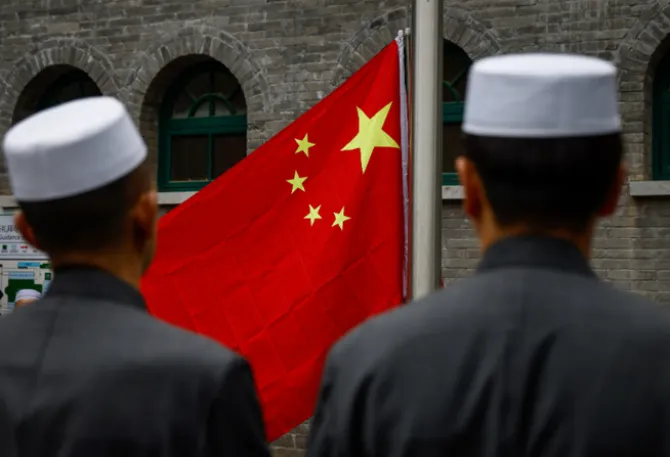
This is the 152nd in the series–The China Chronicles.
In 2019, the Chinease Islamic Association (CIA) and Communist Party of China (CPC) officials met in Beijing to implement the “Five-Year Planning Outline for Persisting in the Sinification of Islam” to make Islam compatible with socialism by 2022. The conference was necessary to fulfil the objectives set forth by the 19th National Party Congress and General Secretary Xi Jinping. Xi stressed sinicisation in 2015, and by 2018, the Communist Party of China (CPC) had drawn up national plans for reconciling Islam and socialist society—implemented over the next five years. The law ensured that Islam in China reflects the nation's values and contributes to the “Core Socialist Values”. According to the 32-point plan for Islam, religious extremist ideology has permeated certain areas, causing Muslims to participate in violent terrorist activities. The emergence of these problems poses a severe threat to the social stability and national security of China. Under the Law, Beijing attempted to reorient Muslims of China towards core socialist values and linked religion to a “mental illness” that needs to be cured.
The emergence of these problems poses a severe threat to the social stability and national security of China.
Muslims of China and the new law
There are approximately 25 million Muslims in China today, including Hui, Uyghurs, Kazakhs, Tatars, and others. However, the sinicisation and degree of acculturation with Hans and Chinese society vary between these groups geographically, economically, ethnically and linguistically. Islam reached China around the 7th century via trade routes, and Muslim traders settled in coastal trading hubs. They built mosques and shrines and had a brief period of social prominence during the Yuan dynasty (1279-1368). During the Ming Dynasty, the Han Chinese rulers banned outsiders and Muslims from exhibiting their culture, including hairstyles, clothing, language, and surnames. In response, the Muslims assimilated themselves with the dominant Han culture, spoke Chinese, and adopted Chinese names—were forebears of the Hui Muslims. These Hui Muslims were scattered throughout China and complied with Confucian values after Chinese rulers introduced new books from the 18th century. In 1952, the CPC translated the holy book of Muslims into Chinese to draw parallels between Islam and communism and described that both ideologies were not averse to each other.
The Muslims assimilated themselves with the dominant Han culture, spoke Chinese, and adopted Chinese names—were forebears of the Hui Muslims.
Similarly, Communist China incorporated 12 million Muslims, primarily from Uyghurs, Kazaks, and Uzbeks of the northwestern province of Xinjiang in 1949. With a contested history and centrifugal tendencies, the Xinjiang region remained under Chinese imperial control for only 425 years until 1949. Subsequently, Uyghur Muslims living in restive Xinjiang were targeted for greater sinicisation and much-needed social cohesion with Han culture. When the Cultural Revolution started from 1966 to 1976, the Uyghur customs, culture, and ideas were particularly attacked and were considered, “foreign invaders and aliens" by Mao Zedong’s wife, Jiang Qing. The CPC attempted to reorient Uyghur Muslims of Xinjiang ‘inwards’ under mainland China's cultural influence. However, the unique geographical template of the region resulted in outside cultural influences penetrating the region, ultimately keeping it oriented outwards. Since 2017, under Xi’s guidance, Uyghur Muslims have been sent to detention centres to decrease external cultural impact for offences such as violating the government's family planning policy, growing a long beard, and wearing a veil or skull cap. To suppress the population growth of the Uyghur Muslims, their women were subjected to forced sterilisation, abortions and forced implantation of intrauterine devices. These policies severely suppressed the population growth among the Uyghur Muslims of the region and the 2020 Statistical Yearbook on Xinjiang lacks birth rates and ethnic population breakthroughs for the first time.
Uyghur Muslims living in restive Xinjiang were targeted for greater sinicisation and much-needed social cohesion with Han culture.
Beijing systematically demonised Muslims all over China and viewed Islam as a threat to CPC primacy. Under the pretext of social stability, the CPC unleashed a string of human rights violations and curbed the religious freedom of Muslims. After 2019, the Hui Muslims who acclimatised to the Chinese culture in the 14th century were imprisoned, and Hui students who travelled abroad were also detained and sent to re-education camps. This constant stigma of alienation and branding of foreigners eventually led to protests. In May 2023, Hui Muslims of Yunnan province protested and clashed with hundreds of Chinese security forces against the partial demolition of the Najiaying Mosque.
China deflects global condemnation
The cultural aggression towards the Muslim minorities of China, especially in Xinjiang has been repeatedly criticised by Western democracies. CPC’s treatment of Muslims in Xinjiang has been deemed as “genocide” by Canada, the United States (US), and other countries. Sanctions were imposed on the CPC officials and the US also prohibited the export of goods that could potentially be used by the CPC to further oppress the Uyghur population. The CPC and Beijing defended the suppression of Uyghur Muslims and their Islamic culture on the flimsy pretext of separatism, occasional violent extremism, and terrorism.
Sanctions were imposed on the CPC officials and the US also prohibited the export of goods that could potentially be used by the CPC to further oppress the Uyghur population.
The CIA plays a key role in promoting China's interests worldwide, especially in the Muslim world. To this end, it oversees religious outreach with Muslim countries and arranges official exchanges with Muslim leaders and institutions. The CIA's guided tours and wide-ranging religious engagement have proven to be effective tools for China in deflecting criticism from major Muslim nations concerning its internal prosecution of Muslims. By promoting an Islamic soft power and building relations with Muslim nations through the CIA, China has been able to deflect criticism and present a more positive image of its policies towards Muslim minorities.
XI uses sinicisation to consolidate power
President Xi has strengthened his grip on power through a comprehensive campaign to eliminate officials who are deemed disloyal, corrupt, or ineffective. He has filled the National Congress of CPC with his allies, and loyalists, thereby, solidifying his power base within the Politburo and the Politburo Standing Committee. On the other side, to retain his grip over Chinese society, Xi frequently expressed concerns about Islam and its traditions. Subsequently, the sinicisation law among Muslim minorities was used by the CPC to consolidate political power and elevate Xi's status as an autocratic populist in China. For this hardened approach against Muslim minorities, Xi has received public commendation throughout China.
The sinicisation law among Muslim minorities was used by the CPC to consolidate political power and elevate Xi's status as an autocratic populist in China.
While the CPC uses the Islamic threat for parochial gains, however, the sinification has created a paradox where the Hui Muslim minorities continue to be stigmatised due to their perceived foreign origin despite centuries of cultural assimilation. Despite the Chinese anti-Muslim campaign has ultimately led to cultural genocide, Xi still stresses on deepening control over “illegal religious activities” to preserve the “hard-won social stability”.
Ayjaz Wani is a Fellow with the Strategic Studies Programme at the Observer Research Foundation.
The views expressed above belong to the author(s). ORF research and analyses now available on Telegram! Click here to access our curated content — blogs, longforms and interviews.




 PREV
PREV


